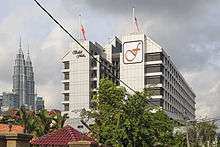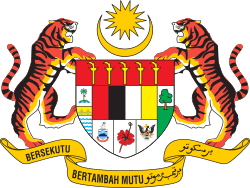Federal Land Development Authority
| Lembaga Kemajuan Tanah Persekutuan | |
| Agency overview | |
|---|---|
| Formed | 6 July 1956 |
| Jurisdiction | Malaysia |
| Headquarters | FELDA Tower, Platinum Park, No. 11, Persiaran KLCC, 50088 Kuala Lumpur, Malaysia |
| Agency executive |
|
| Parent Agency | Prime Minister's Department |
| Website |
www |
The Federal Land Development Authority (FELDA; Malay: Lembaga Kemajuan Tanah Persekutuan) is a Malaysian government agency that was founded to handle the resettlement of rural poor into newly developed areas and to organise smallholder farms growing cash crops. Since the 1990s, it has not established new settlements, but has engaged in a diversified range of economic development and business activities.
FELDA has launched a number of private corporate entities. The largest of these, Felda Global Ventures Holdings, is considered to be the world's largest plantation operator, with 811,140 hectares (2,004,400 acres) of oil palms, mainly across Peninsular Malaysia, but also including other parts of Malaysia and the world.[1]
History

FELDA was formed on 1 July 1956 when the Land Development Act came into force.[2] The first FELDA settlement was in Air Lanas in Kelantan. It was launched in 1957 by then Prime Minister Tunku Abdul Rahman. 400 settlers were relocated to the area[3] . With an initial capital of M$10 million, the next FELDA settlement was opened at Lurah Bilut the following year, comprising 2946.88ha of land and focused on rubber.[4] In the 1960s and 1970s, government policy began to emphasise crop diversification, in an effort to avoid being affected if the world price of rubber were to drop precipitously. In 1961, FELDA's first oil palm settlement opened, with 3.75 square kilometres (1.45 sq mi) of land. As of 2000, 6,855.2 square kilometres (2,646.8 sq mi) (approximately 76%) of the land under FELDA's programs are devoted to oil palms.[5]
FELDA focuses mainly on West Malaysia (Peninsular Malaysia); other government agencies are responsible for land development in the states of Sabah and Sarawak, which form East Malaysia.[6]
In June 2012, Felda Global Ventures raised $3.1 billion from its IPO as the biggest IPO in Asia for year to date.[7]
Scheme management
Settlers were drawn from rural Malay poor.[8] They were to be aged between 21 and 50 years, married, and physically fit. Priority was given to those who did not own any land to farm.[5]
New settlers were assigned to a particular settlement, and were given 10 acres (4.0 ha), 12 acres (4.9 ha) or 14 acres (5.7 ha)[9] of land to cultivate usually either rubber or oil palms.[10] All settlers were required to reside at the settlement itself, and were allotted .25 acres (0.10 ha) in a planned village, where their home — already built by FELDA — was located. Although basic infrastructure, such as piped water and electricity, used to be lacking,[11] nowadays such facilities are readily provided. Schools, medical centres, and places of worship are also provided.[12]
Originally, FELDA schemes were designed as co-operatives, where instead of each settler owning a defined piece of land, each settler held an equal share in the ownership of the particular scheme. However, the settlers did not prefer this scheme, as workers who did not tend to the land properly still benefited (a sort of free rider problem). The government then set up a 3-phase plan, where in the first phase, the co-operative remained as a mechanism for the settlers to learn how to farm. In the second phase, each settler was given a specific plot of land to work, and in the third phase, he was given the land title to that plot.[5] However, the settler was forbidden from selling the land without permission from FELDA or the federal government.[13]
The costs of acquiring, developing and allocating the land are borne by loans made to FELDA settlers. These loans are repaid in monthly instalments deducted from the settlers' income over a 15-year period.[11]
Although settlers are supposed to focus on agricultural activities, it has been reported that a substantial number are also engaged in other activities, such as shopkeeping. Some are even employed in jobs outside the settlement.[11]
In recent years, the growth of urban areas has led to a substantial increase in the land value of some settlements. With permission, many settlers have sold their farms, becoming instant millionaires.[5]
Diversification
FELDA has diversified from its original business of land development, to other economic ventures — some of them entirely unrelated to land resettlement. Although FELDA has subsidiaries involved in businesses such as marketing, transportation, milling, etc.,[5] it also reportedly has a stake in some major Malaysian banks, such as Maybank.[14]
FELDA in Sarawak
FELDA does not really make a significant presence in Sarawak. There is only one FELDA in Sarawak, which is located at Kampung Sampadi, Lundu District. However, the status of this FELDA land is still disputed between being a settlement or plantation-only scheme. Local villagers who are hired to work here was not being given any of the lands provided, unlike their counterparts in West Malaysia.
SALCRA (Sarawak Land Consolidation and Rehabilitation Authority), a state government agency is more prominent in developing agricultural lands for palm oil plantation use in Sarawak compared to FELDA.
In popular culture
- In 2006, FELDA had produced its first movie, Bilut, named after the first FELDA settlement ever in Malaysia. Starring Rosyam Nor, the main plot of Bilut is about the obstacles faced by the early settlers of FELDA Lurah Bilut.
Notes and references
- ↑ "Felda proud of its achievements". New Straits Times. 7 July 2009.
- ↑ "Penubuhan". Retrieved 19 February 2006.
- ↑ http://ayerlanas.pjk.com.my/index.php?option=com_content&task=view&id=3&Itemid=1. Retrieved 18 September 2013. Missing or empty
|title=(help) - ↑ Aziz, Noreen Noor Abd; Wan Haslin Aziah Wan Hassan; Nur Adilah Saud (19 December 2012). "The Effects of Urbanization towards Social and Cultural Changes among Malaysian Settlers in the Federal Land Development Schemes (FELDA), Johor Darul Takzim". Procedia - Social and Behavioral Sciences. 68: 911. doi:10.1016/j.sbspro.2012.12.276. ISSN 1877-0428. Retrieved 8 July 2013.
- 1 2 3 4 5 Simeh, Arif & Tengku Ahmad, Tengku Mohd. Ariff (2001). "The Case Study on the Malaysian Palm Oil". Retrieved 19 February 2006.
- ↑ Manshard, Walther & Morgan, William B. (eds., 1988). "Malaysia". Retrieved 19 February 2006.
- ↑ Gough, Neil (13 June 2012). "Felda Raises $3.1 Billion in Asia's Biggest I.P.O.". The New York Times.
- ↑ Ryter, Loren S. (10 Jan 2005). "A History of Race Relations in Malaysia". Malaysia Today.
- ↑ Simeh, A. and Tengku Ahmad, T.M.A., 2001. The case study on the Malaysian palm oil. REGIONAL WORKSHOP ON COMMODITY EXPORT DIVERSIFICATION AND POVERTY REDUCTION IN SOUTH AND SOUTH-EAST ASIA (BANGKOK, 3-5 April 2001) ORGANIZED BY UNCTAD IN COOPERATION WITH ESCAP. Available from: http://r0.unctad.org/infocomm/Diversification/bangkok/palmoil.pdf. Accessed 7 October 2007.
- ↑ "Kawasan Kebun". Retrieved 19 February 2006.
- 1 2 3 Massard, Josiane L. (1988). "Are Malaysian land settlers (new) peasants? Antropological observation of a nascent Community". Retrieved 19 February 2006.
- ↑ "Kawasan Perkampungan". Retrieved 19 February 2006.
- ↑ Sbaran, Mohammad Shatar (2001). "MALAYSIA". Retrieved 19 Feb 2006.
- ↑ "The National Auctioneer". (3 Sep 2005). Malaysia Today.

